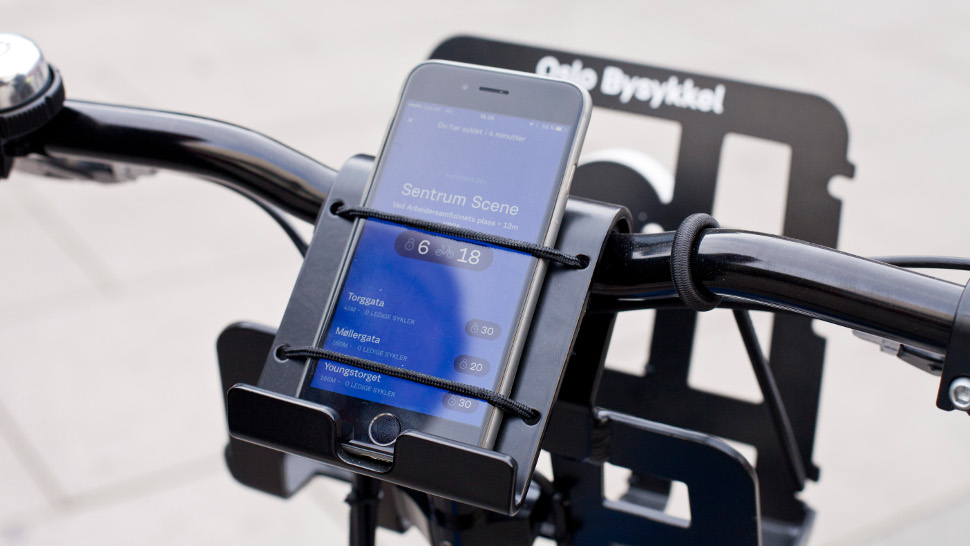Why Oslo's smart bikes could be the key to cracking air pollution
TechRadar Pro meets the Norwegian bike-sharing company looking to reshape how cities work.

As the world around us becomes smarter and more connected, the way we move and travel around the places we live is also becoming more intelligent - largely thanks to technology.
With many people fed up of sitting in lengthy traffic jams every day, and environmental concerns impacting more and more areas of life, public transport is becoming a key part of all modern cities.
But how can technology help ensure that people are able to travel smarter?
A click away

TechRadar Pro headed to the Norwegian capital of Oslo to meet Urban Infrastructure Partner (UIP), a company that is looking to use its expertise to help improve the way that cities run.
The company, which was formed only three years ago, now runs Oslo’s Bysykkel (City Bike) network, the equivalent of London’s ‘Boris Bikes’, offering cycles for hire that can be used to navigate around the city at a fraction of the cost of owning a car.
UIP now oversees a network of 3,000 bikes across the city during the April to December season, ensuring commuters and tourists alike can get around on two wheels, but is now also looking to use the insights it has gained from the data produced in its bikes to help make Oslo a smarter, cleaner city.
“We kind of stumbled into becoming a technology company,” Johan Høgåsen-Hallesby, UIP CTO, tells TechRadar Pro at the company’s office, a stone’s throw from Oslo’s Sentralstasjon train station.
Sign up to the TechRadar Pro newsletter to get all the top news, opinion, features and guidance your business needs to succeed!
“Public transport is really about being frustrated...unlocking a bike should only be a click away."

The bikes are stored at a number of stations around the city, with users paying 299 NOK (around £27) for an annual subscription that allows unlimited 45 minute rentals that can be checked in and out whenever they reach a new location. Each bike has a receiver within the body, allowing UIP to track usage data, and also monitor for any needed repairs or faults.
UIP works closely with Google Cloud to host the huge amounts of data generated each day. This information is then all analysed in real time, meaning UIP’s platform can respond to data from the previous day and tweak itself accordingly to allow for greater efficiency.
This includes sending push notifications warning of road closures or works that may disrupt a journey, or weather information that could save riders from a soaking.
"It's a completely different way of working...it has changed everything," says Høgåsen-Hallesby.
And this has also allowed UIP to extricate some very interesting findings, including that the most popular bike trip on its network across the whole of Oslo is just 450m long - from the city’s main station to a popular office block location.
Overall, the company found that each bike is used between seven or eight times a day, almost double the figure from its first year of operation, with a typical ride taking less than ten minutes.
The data also showed that each registered user takes an average of 51 trips during the April to December operational season, and that there was a drop in usage over the weekend and during working hours - allowing for more efficient maintenance to be carried out at slow times.
Smarter

Now, UIP is looking to share its data with the city of Oslo to improve the city, starting with information about air pollution. The company is installing pollution sensors into its docking stations, allowing real-time updates on air quality to be shared directly with the local authorities.
"I think you need collaboration with the city,” he says, “if you left this to the market itself, it would boil down to an offer for the most valuable distances and rides.”
“We don’t want to disrupt public transport in Europe - we just want to make it better”
For now, UIP is looking to build on its existing operations, with the company extending to Norway’s second and third-biggest cities Trondheim and Bergen this year. The company is keen to push not just its own ambitions, but that of Norway as a whole, as the country looks to promote itself as one of the most exciting new hubs for technology start-ups.
"We should not be copying whatever happens in California - we need to be a Nordic company...and that should be reflected in the technology we build,” Høgåsen-Hallesby says.
- Check out our list of the best laptops for business 2018

Mike Moore is Deputy Editor at TechRadar Pro. He has worked as a B2B and B2C tech journalist for nearly a decade, including at one of the UK's leading national newspapers and fellow Future title ITProPortal, and when he's not keeping track of all the latest enterprise and workplace trends, can most likely be found watching, following or taking part in some kind of sport.